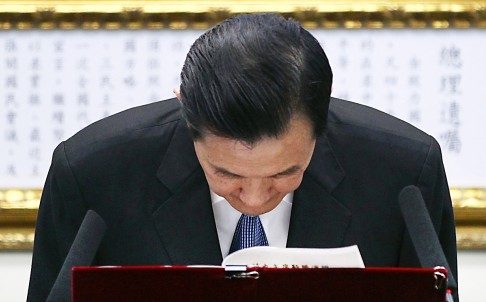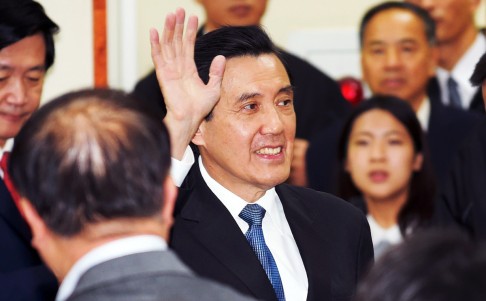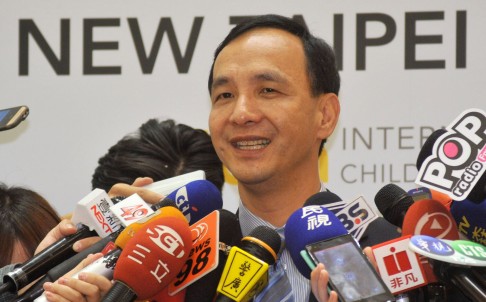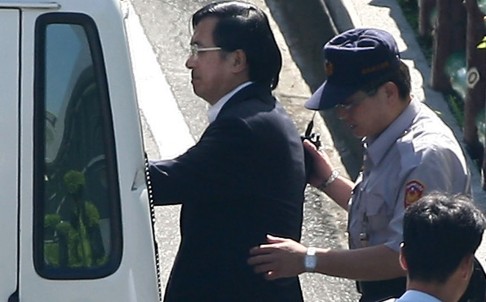Mainland Chinese hope Taiwan elections will revive Sun Yat-sen's spirit of democracy
PUBLISHED : Tuesday, 02 December, 2014, 1:35pm
UPDATED : Tuesday, 02 December, 2014, 5:49pm
Fanny WY Fung in Taipei [email protected]

Wang Xueli, of Chongqing, an advocate of the "Three Principles of the People" of Sun Yat-sen (inset), attended an election observation tour in Taiwan last weekend. Photo: Fanny Fung
Wang Xueli, of Chongqing, an advocate of the "Three Principles of the People" of Sun Yat-sen (inset), attended an election observation tour in Taiwan last weekend. Photo: Fanny Fung
Taiwan's largest-ever election last Saturday attracted a group of special visitors from across the strait, who came to learn from the island’s democratic experience in the hope of reviving the century-old spirit of Sun Yat-sen’s Republic of China on the mainland.
Wang Xueli, a microblogger from Chongqing, joined a week-long tour to watch the poll, organised by the Mainland and Taiwan Co-operation Association.
She joined about a dozen of other mainland participants who share the political belief in the “Three Principles of the People” – nationalism, democracy and the livelihood of the people, laid out by the father of modern China, Sun Yat-sen.
“The rise in interest in the Republic of China’s principles among mainland residents is the result of their increasing ability to make political judgments,” said Wang, who described herself as a “post-70s generation" woman, and works in market research.
“It reflects people’s aspirations for democracy and good governance.”

Independent candidate Ko Wen-je (centre) celebrates his victory over the rival Kuomintang Party candidate, Sean Lien, in Saturday's mayoral election. Photo: Kyodo
The ruling Kuomintang party suffered a disastrous showing in the weekend's local polls, which led to Premier Dr Jiang Yi-huah and 81 members of his cabinet resigning yesterday.
President Ma Ying-jeou is also likely to resign as chairman of the party tomorrow, to take full responsibility for the party's worst electoral setback since coming to power in 1949.
The KMT was able to hold on to only six cities and counties in the elections, less than half of the 15 it held before the vote.
The week-long tour by mainland observers included visits to the campaign offices of candidates and meeting with political party officials; they also paid tribute to late president Chiang Kai-shek at the Chihhu Presidential Burial Place.
Some group members even wore badges with the emblems of the KMT party or the republic.
Often dubbed guo fen – an abbreviation standing for “fans of the Republic of China” – netizens such as Wang have emerged in recent years to spread the republic’s founding philosophy among mainland residents.
Identifying themselves with the ROC, although living in the People’s Republic of China under the Communist Party’s rule, some “celebrated” the Double Tenth Festival this year on internet forums.
This caught attention of the hardline Global Times, a newspaper affiliated with Beijing’s official People’s Daily, which, in an editorial, described the “fever for the Republic of China” as a political tool in disguise to challenge the mainland authorities.
Wang said: “Due to the political circumstances on the mainland, we are not allowed to take any action ... what we mostly do is to reconstruct historical truth through exchanges in order to explore a way of transformation for China in the future.
“We advocate a return to the 1947 constitution,” she said, referring to the ROC’s constitution written before the Communist Party took over the mainland.
Wang said she hoped that learning about the campaign strategies in free elections, which were not practised under the mainland regime, would help to restore the democratic experience to the mainland.
Gao Zhen, a Beijing-based modern artist, who along with his brother, Gao Qiang, are well known for their work that is critical of China’s Communist regime, was also part of the tour. He said it was his first visit to Taiwan.
“The emergence of ‘fans of the Republic of China’ on the mainland came as early as in the 1990s,” the artist said. “By now this phenomenon is no longer just reminiscing about the past; it has moved on to a philosophical and political level.
“I believe this new wave of thinking, which is gaining greater popularity among young mainland people, tells us something about the future of China.
“In about 2002 or 2003, a group of young people started to become keen to learn more about the history of the Republic of China and it led to more discussions on the subject . As they understood more, they found that all the history they learned about the Republic of China in mainland schools was wrong.”
Two years ago, Gao and some friends published microblog posts in which they appealed to mainland citizens to apply for passports from the Taiwanese government.
He said that he did not really apply, and the call was a strategy only to publicise their ideas, but the posts went viral.
Critical remarks made online by guo fens are often removed from mainland websites.
Seen as sensitive, other members of the tour declined to speak on the record for fear of reprisal after they return to the mainland.
However, not every mainlander interested in Taiwan politics believes that the views of guo fens are practical in modern-day China.
Nick, a mainland student studying in Taiwan, who took part in a programme for mainland and Taiwan students to study the “nine in one election”, said he had come across the advocacy of guo fens on social media, but he believed such ideas were not pragmatic enough for today’s China.
“This [advocacy] reflects people’s dissatisfaction with social issues, but it’s projected in an alternative way,” he said. “It is just like some Hong Kong people talking about times under the rule of the British colonial government.
“Even when the Communist Party talks about the ‘three principles of the people’ it will twist it in a way to suit itself, like creating a ‘socialism with Chinese characteristics’,” he said.
Nick declined to make his full name public, saying that he was a member of the Communist Party and could not make such comments openly.






